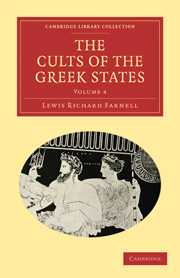CHAPTER V - APOLLINE RITUAL
Published online by Cambridge University Press: 05 October 2010
Summary
The record of the ritual and festivals consecrated to the Apolline worship has more than a merely antiquarian interest, for no part of the history of the god reveals more clearly the intimacy of his association with the primitive and the advanced stages of Hellenic civilization.
We may observe, in the first place, that the ceremonies as far as they are recorded are open and public, nor is there any indication of an Apolline ‘mystery’ with secret rites of initiation, though private guilds mainly in the later period were sometimes instituted in his honour. We have only two examples of a nightly and mystic service, namely the special preparation of the Argive priestess and the Klarian prophet; and here the officiating individuals enter into communion with the deity through sacrament. Otherwise the sacrifices are mainly of the usual Hellenic form, being occasionally bloodless oblations, but far more frequently animal-offerings, among which we must reckon with a survival of human sacrifice. The former are found in the Delian-Hyperborean ritual of the ἀπαρχαί, and belong therefore to the oldest period; and in Delos stood the famous altar of Apollo the Father, known in later times as ‘the holy’ or ‘righteous’ altar, because of the ritual law that forbade the shedding of blood upon it. Clemens speaks of it as most ancient, and Porphyry supposes that the vegetarian-ritual with which it was associated descended from the earliest period of human history when man was innocent of blood.
- Type
- Chapter
- Information
- The Cults of the Greek States , pp. 253 - 306Publisher: Cambridge University PressPrint publication year: 2010First published in: 1907



